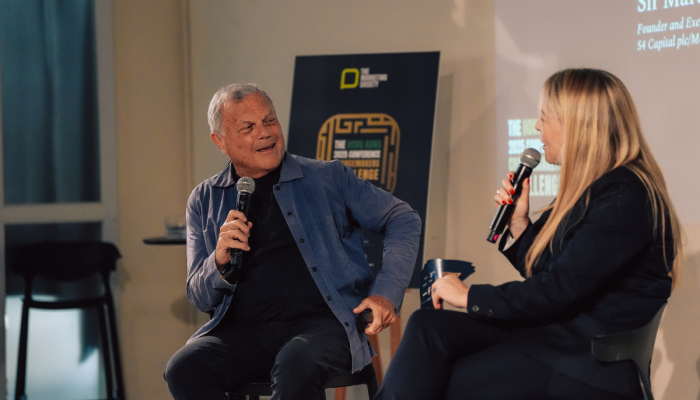As a species, we love absolutes.
Life throws so much crap at us, it’s a relief when someone tells you:
This is the way it is, so you don’t need to worry.
Sadly, in the world of advertising and marketing, our desire for absolutes means we’re too often misled by self-proclaimed ‘gurus’ and lazy ‘thought leaders’ who’ve figured out a confidently delivered platitude goes a long way.
You know the type of thing…
“In 2020, brands must tell stories to survive.”
“Digital marketing is dead; 2020 is all about digital experiences.”
“Customer-driven data will shift the paradigm for all online relationships in 2020.”
I even invented a character on my podcast – Brad Platitudes – who playfully imitates this tendency to say something meaningless with confidence in the hope nobody questions that you’ve really said nothing.
One of Brad’s key pieces of advice?
To be creative, you have to be…creative.
Presented in a bold, colourful font over a black and white photo of a man looking earnest on a conference stage and you’d struggle to pick such a platitude out of a line-up of Gary Vee-type posts.
We want to believe
Problem is, in our more fragile moments, we might see such proclamations or platitudes and wonder:
“Hmm, maybe that’s why my last campaign didn’t hit the mark. I do need to do more storytelling with my brand.”
Or a busy business owner with a stressful schedule might glimpse such vague nonsense and forward it to the team with a helpful note:
“Do more of this; experts say it works.”
And do you know what?
Sometimes you might find a small nugget of truth in the platitude.
It might be storytelling could help with your marketing.
But, equally, it might be something else entirely that’s causing your marketing to miss the mark.
Trouble is, because these platitudes are delivered in such a confident style – and in some cases, downright aggressively – you often feel almost bullied into believing they’re irrefutable fact.
And so, you pile all of your energy into proving the nonsense.
It becomes almost self-fulfilling.
You could well end up spending a huge amount of your marketing budget fitting your ideas around what’s likely hastily thought-up gibberish designed to attract a few extra clicks.
Forecast warning
Having worked as a marketer in the world of finance for many years…
And having spent many lost hours studying for regulatory qualifications to avoid falling foul of the FCA’s advertising rules…
I know only too well the folly of talking in absolutes.
And like the financial commentator weary to put a definite date on the next financial crisis, in recent years I’ve become more intimately acquainted with that sturdy old friend: the fence.
When it comes to anyone making an absolute claim in our industry these days…
I apply an absolute of my own:
Absolute suspicion.
There is no one-size fits all way to market anything.
Or rather, it’s quite likely there is no one-size fits all way to market anything. (I should check myself for absolutes, right?)
Some people will tell you to absolutely never use humour in advertising.
But then look at the incredibly memorable Haribo adverts by Quiet Storm, where adults are talking about the sweets in children’s voices.
Some people will tell you to absolutely never ‘reverse out’ text in an advert (even David Ogilvy is guilty of saying this).
Yet look at the excellent Spotify ‘nostalgia’ adverts from Who Wot Why last year, where there’s barely any white space in sight.
And some people will tell you it’s absolutely impossible to be successful unless you have a website for your business that contains a blog.
Can someone tell the incredibly successful agency, Uncommon, who’ve barely got three pages of content on their website.
Of course, on other occasions humour won’t be right…
Sometimes having black text on a white background is clearer…
And sometimes a content-filled website is great for business.
But this is my point…
Every new brief is a new challenge.
In advertising and marketing, if we base our thinking around absolutes, we miss new opportunities.
We prevent ourselves from discovering ways of doing things differently, approaches that may be even more successful than how we did things in the past.
Sure, you can learn from what’s been successful. You can adopt certain ideas and bang them together to invent new ones. And certain new bandwagons might be worth jumping on.
But in my experience, it pays to be extremely wary of anyone in this industry who speaks in absolutes.
Usually, you’ll find they’re talking absolute nonsense.



